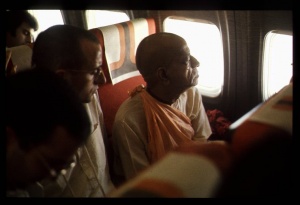CC Adi 12.35: Difference between revisions
m (1 revision(s)) |
No edit summary |
||
| Line 1: | Line 1: | ||
{{ | [[Category:Sri Caitanya-caritamrta - Adi-lila Chapter 12|C035]] | ||
<div style="float:left">'''[[Sri Caitanya-caritamrta|Śrī Caitanya-caritāmṛta]] - [[CC Adi|Ādi-līlā]] - [[CC Adi 12|Chapter 12: The Expansions of Advaita Acārya and Gadādhara Paṇḍita]]'''</div> | |||
<div style="float:right">[[File:Go-previous.png|link=CC Adi 12.34|Ādi-līlā 12.34]] '''[[CC Adi 12.34|Ādi-līlā 12.34]] - [[CC Adi 12.36|Ādi-līlā 12.36]]''' [[File:Go-next.png|link=CC Adi 12.36|Ādi-līlā 12.36]]</div> | |||
{{CompareVersions|CC|Adi 12.35|CC 1975|CC 1996}} | |||
{{RandomImage}} | |||
==== TEXT 35 ==== | ==== TEXT 35 ==== | ||
<div | <div class="verse"> | ||
īśvarera dainya kari’ kariyāche bhikṣā | :īśvarera dainya kari’ kariyāche bhikṣā | ||
ataeva daṇḍa kari’ karāiba śikṣā | :ataeva daṇḍa kari’ karāiba śikṣā | ||
</div> | </div> | ||
| Line 12: | Line 16: | ||
==== SYNONYMS ==== | ==== SYNONYMS ==== | ||
<div | <div class="synonyms"> | ||
''īśvarera''—of the Supreme Personality of Godhead; ''dainya''—poverty; ''kari''’—establishing; ''kariyāche''—has done; ''bhikṣā''—begging; ''ataeva''—therefore; ''daṇḍa''—punishment; ''kari’''—giving him; ''karāiba''—shall cause; ''śikṣā''—instruction. | |||
</div> | </div> | ||
| Line 19: | Line 23: | ||
==== TRANSLATION ==== | ==== TRANSLATION ==== | ||
<div | <div class="translation"> | ||
“But he has made the incarnation of Godhead a poverty-stricken beggar. Therefore I shall punish him in order to correct him.” | “But he has made the incarnation of Godhead a poverty-stricken beggar. Therefore I shall punish him in order to correct him.” | ||
</div> | </div> | ||
| Line 26: | Line 30: | ||
==== PURPORT ==== | ==== PURPORT ==== | ||
<div | <div class="purport"> | ||
To describe a man as an incarnation of God, or Nārāyaṇa, and at the same time present him as poverty-stricken is contradictory, and it is the greatest offense. The Māyāvādī philosophers, engaged in the missionary work of spoiling the Vedic culture by preaching that everyone is God, describe a poverty-stricken man as daridra-nārāyaṇa, or “poor Nārāyaṇa.” Lord Caitanya Mahāprabhu never accepted such foolish and unauthorized ideas. He strictly warned, māyāvādi-bhāṣya śunile haya sarva-nāśa: ([[CC Madhya 6.169]]) “Anyone who follows the principles of Māyāvāda philosophy is certainly doomed.” Such a fool needs to be reformed by punishment. | To describe a man as an incarnation of God, or Nārāyaṇa, and at the same time present him as poverty-stricken is contradictory, and it is the greatest offense. The Māyāvādī philosophers, engaged in the missionary work of spoiling the Vedic culture by preaching that everyone is God, describe a poverty-stricken man as ''daridra-nārāyaṇa'', or “poor Nārāyaṇa.” Lord Caitanya Mahāprabhu never accepted such foolish and unauthorized ideas. He strictly warned, ''māyāvādi-bhāṣya śunile haya sarva-nāśa:'' ([[CC Madhya 6.169]]) “Anyone who follows the principles of Māyāvāda philosophy is certainly doomed.” Such a fool needs to be reformed by punishment. | ||
Although it is contradictory to say that the Supreme Personality of Godhead or His incarnation is poverty-stricken, we find in the revealed scriptures that when the Lord incarnated as Vāmana, He begged some land from Mahārāja Bali. Everyone knows, however, that Vāmanadeva was not at all poverty-stricken. His begging from Mahārāja Bali was a device to favor him. When Mahārāja Bali actually gave the land, Vāmanadeva exhibited His all-powerful position by covering the three worlds with three steps. One should not accept the so-called daridra-nārāyaṇas as incarnations, because they are completely unable to show the opulence of the genuine incarnations of God. | Although it is contradictory to say that the Supreme Personality of Godhead or His incarnation is poverty-stricken, we find in the revealed scriptures that when the Lord incarnated as Vāmana, He begged some land from Mahārāja Bali. Everyone knows, however, that Vāmanadeva was not at all poverty-stricken. His begging from Mahārāja Bali was a device to favor him. When Mahārāja Bali actually gave the land, Vāmanadeva exhibited His all-powerful position by covering the three worlds with three steps. One should not accept the so-called ''daridra-nārāyaṇas'' as incarnations, because they are completely unable to show the opulence of the genuine incarnations of God. | ||
</div> | </div> | ||
__NOTOC__ | |||
<div style="float:right; clear:both;">[[File:Go-previous.png|link=CC Adi 12.34|Ādi-līlā 12.34]] '''[[CC Adi 12.34|Ādi-līlā 12.34]] - [[CC Adi 12.36|Ādi-līlā 12.36]]''' [[File:Go-next.png|link=CC Adi 12.36|Ādi-līlā 12.36]]</div> | |||
__NOTOC__ | |||
__NOEDITSECTION__ | |||
Revision as of 14:16, 9 July 2021

A.C. Bhaktivedanta Swami Prabhupada
TEXT 35
- īśvarera dainya kari’ kariyāche bhikṣā
- ataeva daṇḍa kari’ karāiba śikṣā
SYNONYMS
īśvarera—of the Supreme Personality of Godhead; dainya—poverty; kari’—establishing; kariyāche—has done; bhikṣā—begging; ataeva—therefore; daṇḍa—punishment; kari’—giving him; karāiba—shall cause; śikṣā—instruction.
TRANSLATION
“But he has made the incarnation of Godhead a poverty-stricken beggar. Therefore I shall punish him in order to correct him.”
PURPORT
To describe a man as an incarnation of God, or Nārāyaṇa, and at the same time present him as poverty-stricken is contradictory, and it is the greatest offense. The Māyāvādī philosophers, engaged in the missionary work of spoiling the Vedic culture by preaching that everyone is God, describe a poverty-stricken man as daridra-nārāyaṇa, or “poor Nārāyaṇa.” Lord Caitanya Mahāprabhu never accepted such foolish and unauthorized ideas. He strictly warned, māyāvādi-bhāṣya śunile haya sarva-nāśa: (CC Madhya 6.169) “Anyone who follows the principles of Māyāvāda philosophy is certainly doomed.” Such a fool needs to be reformed by punishment.
Although it is contradictory to say that the Supreme Personality of Godhead or His incarnation is poverty-stricken, we find in the revealed scriptures that when the Lord incarnated as Vāmana, He begged some land from Mahārāja Bali. Everyone knows, however, that Vāmanadeva was not at all poverty-stricken. His begging from Mahārāja Bali was a device to favor him. When Mahārāja Bali actually gave the land, Vāmanadeva exhibited His all-powerful position by covering the three worlds with three steps. One should not accept the so-called daridra-nārāyaṇas as incarnations, because they are completely unable to show the opulence of the genuine incarnations of God.